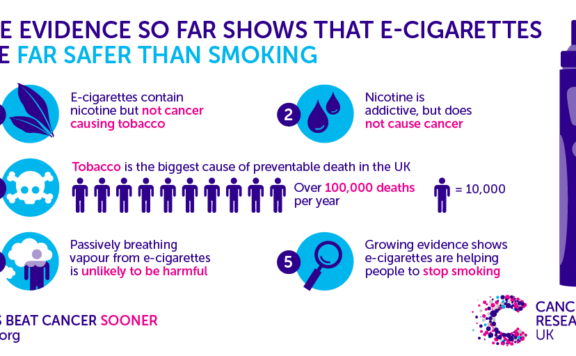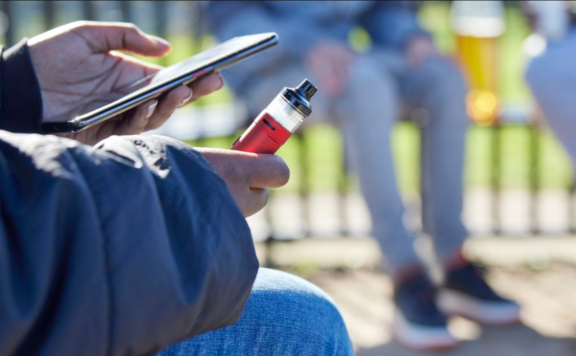Scotland Tonight: Scottish government urged to take action to regulate vaping amid addiction fears.
Ryan McNairn first took up smoking at 17. Seven years later, he was able to quit, but soon after, he was once again ensnared by another addiction.
He said on STV’s Scotland Tonight show that he wanted to test disposable vapes since they “came out looking fun and exciting.”
In essence, the addiction returned and became stronger than it had ever been.
“I simply couldn’t quit vaping. Everywhere I went, early in the morning and late at night, I would vape.”
Table of Contents
Impending health crisis
Scotland has set itself the goal of having a smoke-free society by the year 2034, but as Holyrood examines more tobacco control measures, worries about the possibility of a new health disaster are growing.
A recent study indicates that the popularity of vaping has increased significantly in recent years, particularly among young people.
Some people believe it to be a successful strategy for permanently quitting smoking. Have e-cigarettes, however, become a gateway to nicotine addiction for some people?
The negative effects of smoking are already widely acknowledged, but it is still unknown how vaping will affect your health.
This has spawned a broad, contentious, and ongoing discussion over the functionality, usability, and appeal of the devices.
When his addiction was at its worst, Ryan was using one disposable vape each day, with each one holding about 600 puffs.
He stated, “I’ve never been this addicted to anything in my life. “It’s always in your hand, and you don’t really have the same rush as you would with a cigarette.
“You never feel truly pleased; instead, you always chase the buzz.”
Following laser therapy sessions, Ryan has now gone six weeks without vaping.
“I don’t worry about running out and wondering where I’m going to get my next vaporizer,” he added.
“The goal is to gain more control over your life and overcome your addiction.”
‘Vapes are present everywhere
According to statistics, there are now 4.3 million vapers in Britain, a record number.
Furthermore, there is proof that more and more young people are exploring it.
In 2022, research by Action Against Smoking (ASH) revealed that 7 percent of British children and teenagers aged 11 to 17 were vaping. That contrasts with 4 percent in 2020.
Students in their sixth year of school who we spoke with reported noticing a noticeable increase in the number of young people who vape after the outbreak.
STV News reported in August that hundreds of vapes have recently been seized from high school students in Scotland
Student Mohammad Miah remarked, “I see it practically everywhere. Everyone can see today that it’s casual outside the school and on the streets in town.”
“Sometimes I forget that you have to be 18 to vape,” continued Aimee Simpson, “since no one seems to worry about that.”
Despite the fact that you must be older than 18 to lawfully buy vapes, there was a perception that they were easy to obtain.
“I’ve never heard of somebody whining or lamenting that they couldn’t acquire a vape,” Aimee added.
“I presume they have older friends who do it for them,” continued Mohammad. I’ve spoken to a couple of my friends, and it’s shocking to learn that sometimes their parents purchase it for them.”
All of the individuals we spoke with, who were 16 or 17, reported that younger kids seem to be adopting vaping far more.
“I have a few acquaintances who have younger siblings who are 12 or 13, and I know they just stroll into a corner shop and someone will give it to them,” claimed Kristina Owhonda.
“Despite being 13 years old and having a youthful appearance, they are nevertheless simply sold.”
The students think that social media significantly influences how vaping is presented and viewed.
Dominika Szerement stated, “I think one of the main concerns is that a lot of influencers and people you see on social media support them. Young folks desire to resemble them.”
Sahil Panwar continued, “You pretty much see people vaping in videos, blowing the smoke out and they’re acting cool, like the cool music in the background.
“They occasionally display their collections, including the many hues and flavors.”
‘Extremely concerned
The chief executive of Ash Scotland, Sheila Duffy, thinks that young people’s vaping has to be addressed immediately.
“We’ve noticed a sharp increase in the number of youngsters and young adults vaping, and this causes us great concern,” she stated.
“We anticipate the Scottish Government will provide numbers at the end of the year, but we already know what is going on because local authorities, parents, and schools have been telling us what is occurring.
“There is a serious concern since these gadgets are entering areas where tobacco usage was waning and being suppressed.
“We hear about elementary schools taking away children’s vapes, and we hear about parents giving their children vapes because they believe it’s okay and won’t cause any problems. However, this is a huge concern because these drugs may be highly addictive.
“To prevent this from happening, something needs to be done about the marketing, promotion, advertising, and product regulation.”
The Scottish Government is thinking about enacting stricter regulations governing the vaping promotion and advertising.
This week, the results of a consultation it commissioned were released, and they will be used to guide future policy choices.
The 757 replies revealed “polarizing views,” with roughly 50% in favor of the plans and 50% opposed to them.
With the goal of making Scotland “smoke-free” by 2034—meaning that under 5% of adults will smoke cigarettes—Holyrood is also currently updating its tobacco action plan.
What is being implemented in New Zealand is one of the measures being examined.
The present legal smoking age of 18 will be hiked year after year, making individuals younger than 14 in 2027 ineligible to purchase cigarettes for the rest of their lives. This is one of the strictest strategies in the world for reducing smoking-related mortality.
Professor Steve Turner has studied the effects of smoking and passive smoking on children and adolescents for many years. Additionally, he is worried about the rise in teen vaping.
“It’s obvious that kids shouldn’t smoke or vape because both activities are harmful,” he said.
“Although there is some evidence that vaping is less dangerous in adults, it is still harmful, in my opinion. It contains nicotine, a dangerous substance.”
Professor Turner desires that the regulations already applied to tobacco products be extended to the vaping business.
He said that there was a noticeable difference between how stores can exhibit and display vaping equipment—many of them use vibrant colors and appealing kid-friendly tastes.
“That’s in contrast to cigarettes, which are concealed and virtually on the naughty step.
“The same advertising and marketing regulations and rules ought to be applied to all items containing nicotine.”
Not everybody shares his opinion. Tony Stuart, who has operated a vape store in Aberdeen for the past three years, opposes stricter regulations governing advertising.
“The legislation severely limits what we may advertise,” he claimed.
“Except for adopting the cigarette route, where everything is hidden behind a cabinet, I can’t think of anything that could be more limiting.
“People are switching from smoking to vaping, so why would we limit advertising? Nothing about it makes sense.”
Although there has been a little increase in the number of teenage smoking, Tony claims that the numbers are still “minute.”
He claims that his company has a rigorous policy and won’t sell to children either in-person or online.
He explained, “They can’t buy from us unless they’re 18 since we conduct online age verification methods. But the issue we have is the widespread availability of vaping products, particularly disposables. That is the source of the issue.”
According to Dr. Pete Cheema OBE of the Scottish Grocers Federation, limiting advertising could prevent Scotland from meeting its goals for a smoke-free Scotland by 2034.
He claimed that, in a way, the lack of those regulations amounted to an anti-smoking stance.
“We need a system to let customers know the store sells vaporizers. People won’t have a choice if it’s disguised, so if they smoke, they’ll just keep doing so.
“According to our research, vaping is less dangerous and detrimental than smoking, and it can help individuals quit.”







